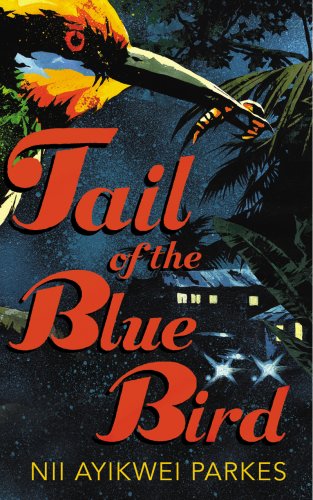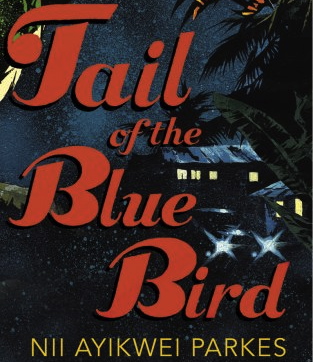 This is a VERY belated post for Ghanaian Literature Week, organised by the wonderful Kinna. I signed up for it back in October, but since then a few things have sucked up a lot of my time and energy.
This is a VERY belated post for Ghanaian Literature Week, organised by the wonderful Kinna. I signed up for it back in October, but since then a few things have sucked up a lot of my time and energy.
Anyway I did read a Ghanaian book during the week itself, and it was an excellent one – Tail of the Blue Bird by Nii Ayikwei Parkes. It’s interesting in that it follows the general trajectory of a genre crime novel, but departs into fresh and interesting territory. It starts with the discovery of a body, then proceeds through the recruitment of a forensics expert to lead the investigation, the introduction of a slightly mismatched sidekick, the details of the investigation, and finally the production of a verdict.
Sounds like a standard police procedural, doesn’t it? Thankfully it’s far more interesting than that.
There’s the language, for a start, which is elegant and well-crafted from the first page to the last, and laced with untranslated Twi words which, for me as a British reader, enhanced the sense of an unfamiliar context but did not impede my understanding at all. There are quite different voices and narrative styles, all handled very effectively.
Then there’s the fascinating interplay between traditional and modern Ghanaian culture, represented by the old hunter Yaw Poku in the isolated village of Sonokrom and the foreign-educated forensics expert Kayo parachuted in from the city. It’s interesting that with the other police characters, it’s a clash of cultures – the police trample over the village, interrogate people, show no respect, and get nothing as a result. But Kayo treats the villagers and their customs with respect, asks for permission from their chief before beginning his investigation, solicits Yaw Poku’s help and opinions, and is willing to listen to the explanations and sample the potions of the local medicine man. Kayo believes in science, but is surprisingly open to non-scientific explanations as well, and for me this made it a far more interesting novel than if it had been a simple ‘clash’ of modern against traditional. This felt more like a fusion, with both sides taking on elements of the other (Yaw Poku, for example, is impressed by Kayo’s forensic techniques and eager to find out more about them).
Another radical departure from the traditional crime-novel template is in the resolution. I won’t give it away, but will say that it’s far less neat and clear-cut than the endings of most crime novels. Yaw Poku tells a story which bears a striking resemblance to the case being investigated – it could be his explanation of what really happened, or it could be just a story. Kayo puts together a report for his superior, giving him the “CSI-style” report he asked for, but despite the scientific language and the detailed description of facts and evidence, it could be a story like Yaw Poku’s. Once again, traditional and modern are merging and blurring, and the boundaries between the two are far from clear. Maybe there’s more truth and logic in traditional culture than we often recognise – and more fiction and imagination in science than we like to admit.
My only criticism was that the part with Kayo in the city encountering various obstacles to taking the case felt a little long. It’s obvious he’ll end up taking the case in the end, so I wasn’t sure of the point of dragging it out. But it’s a minor point. The novel is pretty slim as a whole, so the delay was not major. Overall I’m very glad I discovered this book, and would recommend it as something quite different, enjoyable and thought-provoking. Kinna held a Twitter chat with the author, which again I missed, but there’s a summary here if you’d like to find out more about the book and the writer.
Click here to see more books I’ve reviewed.




There are 7 comments
Sounds like a fascinating novel! I haven’t read any Ghanaian literature before, am glad to be introduced to it 🙂
Thank you for participating. As for the late date, it happens. Although I was about to send the Ghanaian Navy to come look for you. You’d gone quite there for a long moment. I doubt the Navy would have found you; ours doesn’t have a single boat! I’m glad that you like the book. The Twitter chat was a lot of fun and I will host another one in the new year. Thanks for the review.
Very interesting – I have never read a Ghanaian book before and this would sound a good place to start if my list of books to be read was not already so long. Interesting that you found the language such a feature of the book – particularly the Twi words. Evidently a writer to watch
Thanks for the comments, and sorry for the long delay – have been busy with a lot of changes in my life, and haven’t been online much at all. Glad I just managed to evade the fearsome clutches of the Ghanaian Navy, Kinna! Will look out for your Twitter chat in the New Year. Nivedita and Tom, I’d definitely recommend it if you haven’t read any Ghanaian books before – and Kinna’s site has lots more great recommendations!
Nii Ayikwei Parkes is such a talented writer.
I hope you will participate in this year’s Africa Reading Challenge by Kinna @ kinnareads:
https://kinnareads.wordpress.com/2012/01/18/africa-reading-challenge/
Hi Kwadwo
Yes, he is – I’m glad I discovered his writing. Thanks for letting me know about Kinna’s latest challenge! I might well sign up – my plans this year are quite uncertain, but 5 books is not too much, so it should be OK. I’m reading one already that would qualify, Maps by Nuruddin Farah. Thanks for visiting!